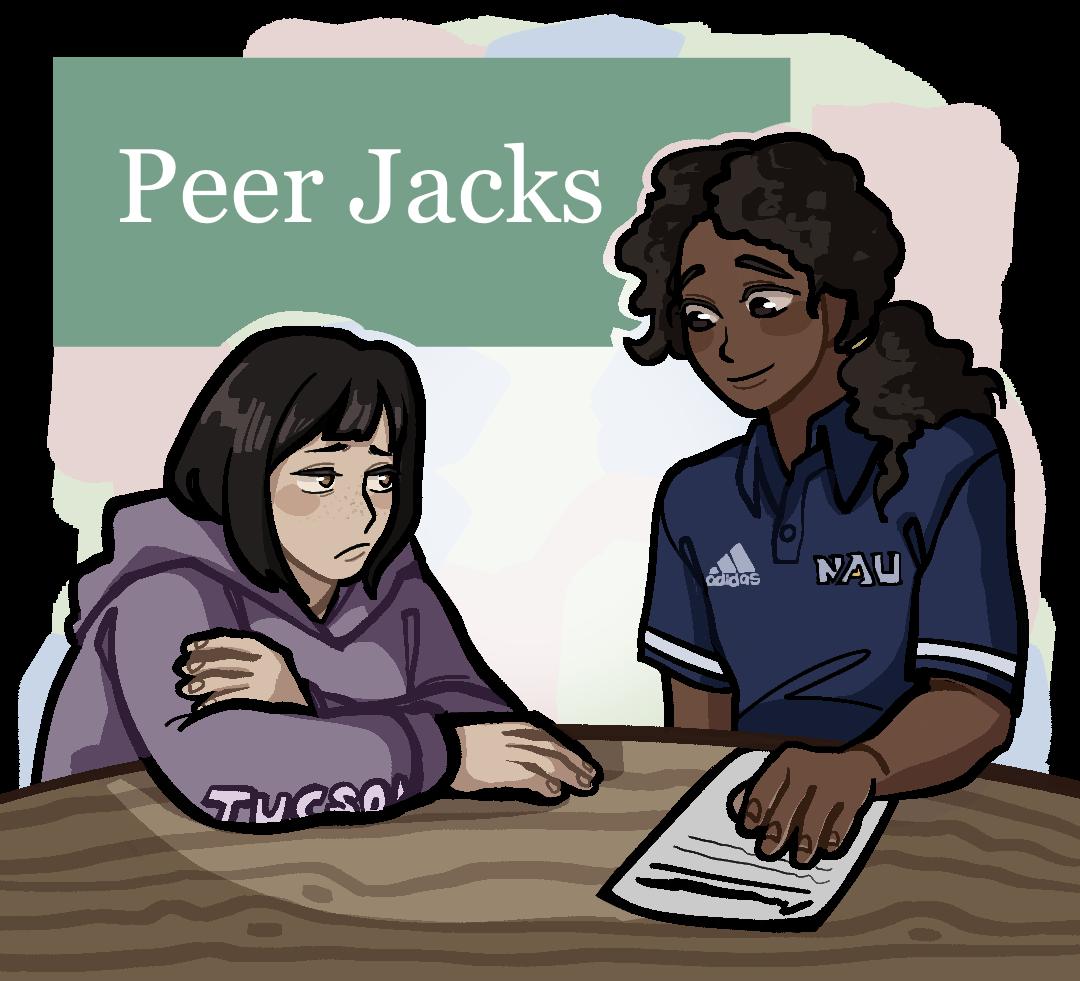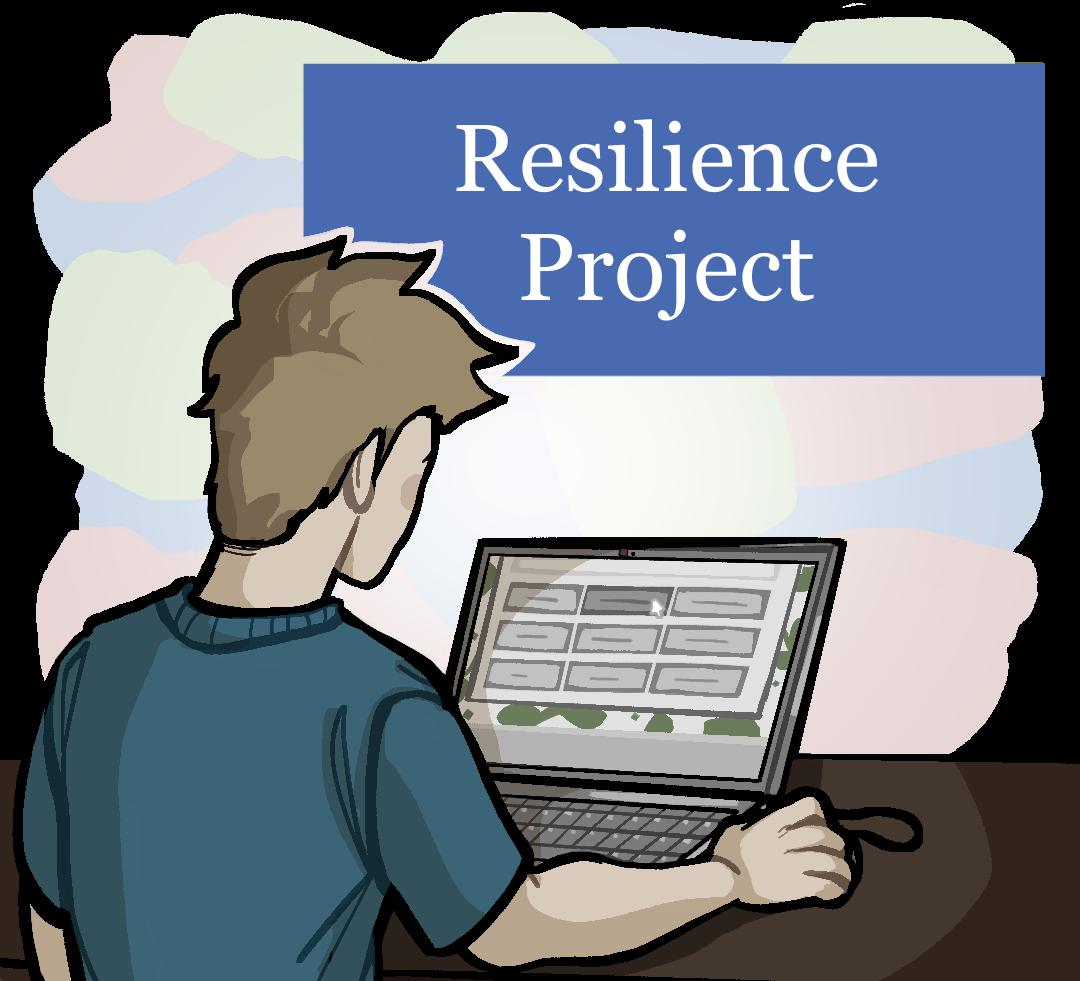
10 minute read
FEATURES Awareness to action
NAU addresses mental health through programs and resources
Olivia Lopez
With growing recognition of the importance of addressing mental health, NAU has developed over 15 programs to support students. While some fell through or were unsuccessful, the majority flourished to service the student population. Some of the most frequently-used programs include the Mental Health Support Squad (MHSS), Peer Jacks Mentoring and the Resilience Project Carlos Calderón is a tenured associate psychology professor at NAU. He began in 2018 as a visiting assistant professor and has seen mental health services at NAU change over time. He said having access to mental health services is crucial for students’ academic success.
“It is important for college students to have mental health services available because mental health is intertwined with academic success,” Calderón said.
Students have access to assistance from NAU that pertains to various aspects of their well-being, Calderón said, such as their physical and mental health, abilities and disabilities, identity, diversity and personal development.
He said he believes NAU can destigmatize mental health services through better communication. Displaying diverse groups of people using services that work with mental health, Calderón said, can normalize reaching out for help.
“These communications should feature college students so that students can relate to the content and the intended population,” Calderón said. “These communications should also emphasize that many students are using these services, suggesting that it is a normal thing to do.”
NAU Peer Jacks is an initiative exclusive to firstyear students to assist with the transition to college. The program offers one-on-one peer mentoring for students to work with another person through academic and personal challenges. Peer Jacks mentors assist students beyond the classroom and work to connect students with the Flagstaff community. To better serve the student population, the program expanded its outreach over the past few years.
Peer Jacks Mentoring began servicing in-state students
Halie Swanson, a senior coordinator with Peer Jacks, said the program supports students’ wellness and development while in college. Mentors schedule biweekly meetings with mentees, and the pair plan out and work toward the student’s improvement and success, Swanson said. The Peer Jacks program matches students with mentors based on similarities in majors and interests.
Students can attend Peer Jacks social, cultural and academic events throughout the year. Past trips for first-year, out-of-state students include visits to the Grand Canyon, Sedona and Lowell Observatory. These trips are concentrated in northern Arizona because many out-of-state students have yet to see the area.
“The goal is to get first-year students acclimated to NAU and Flagstaff, along with getting them connected to peers as they transition into college,” Swanson said.
Senior Kirsten Nolker, a student development coordinator with Peer Jacks, said the number of mentors on staff has steadily increased each year, and they hope to maintain that trend. Last year, there was a staff of 40 mentors; this year, they had 60 mentors and next year, they plan to hire 75 to 100 staff members.
The transition into college can cause struggles for incoming students, such as homesickness, cultural differences, new academic pressure, social isolation and financial concerns. Resources are made available to students in order to help them navigate these challenges.
The first year the program welcomed first-year, in-state students was 2022. Before that, the program only offered its services to out-of-state, first-year students to help with retention rates, which were lower than that of in-state students, Nolker said.
Swanson said the program expects to receive more instate students from lower-income families in the upcoming year due to the Access2Excellence initiative NAU President José Luis Cruz Rivera advocated for, offering free tuition to students from households that have an annual income of less than $65,000.
She said they want their Peer Jacks mentorship team to be well-trained for the different populations of students that will join the program in the upcoming years.
“[We] take a good hard look at the training curriculum that we give to our mentors and make sure we have a wellequipped and trained team to handle a wide variety of struggles,” Swanson said.
Peer Jacks collaborates with other on-campus mentoring programs, holding events with the Office of Inclusion and First-generation programs. Nolker said she hopes they can continue to increase those collaborations.
“We can collaborate with other mentoring programs to create more meaningful experiences for students,” Nolker said.
Any changes made to the Peer Jacks program will come from student input, Nolker said. In December, a survey went out to the NAU student population, asking if they were comfortable reaching out to peers or professors for support. Nolker said the coordinators analyze the data and compare results from Peer Jack mentees and other student groups.


“We are not afraid to look at what is working and what not is working and make those changes,” Nolker said.
Resilience Project provides online support
The NAU Resilience Project is an online resource that assists students with increasing positive coping skills and resilience. The project originated at Florida State University (FSU) to connect incoming students to the FSU community and its resources. NAU began using the program in 2020, making it the first university outside of Florida to use it.

FSU created the program to improve students’ academic and emotional coping abilities. Regardless of whether individuals have had prior trauma, the program promotes self-awareness and personal progress. It includes multimedia, interactive audio, video, coping content and tasks to help students find their strengths.
Alix Ford, a health educator in the Health Promotion Office, heads the Resilience Project at NAU. Ford said it is a recommended program for first-year and transfer students and was implemented into NAU100 a transitionary college class for first-year students. The class helps students develop a sense of social, academic and campus community belonging. Students also learn about campus resources meant to support their successes.
“Students are able to identify their own strengths and values, learn new skills and listen to expert talks on a variety of topics,” Ford said.
Since the program is still new, it has not received many modifications.
Ford said the program is constantly seeking creative ideas to integrate the program into student orientations, onboardings, lessons and partnerships.
“I would love to see the program utilized by all incoming students, then even revisited throughout a person’s time at NAU to continue learning new skills,” Ford said.
The NAU Resilience Project has had 5,962 students registered and 4,382 completions in total since it was started. Ford said in this academic year, there have already been 1,200 completions. Data from the program shows the majority of student users of the NAU Resilience Project are aware of their values and the lasting impacts of trauma on one’s well-being, Ford said. More than 70% of students who completed the program said they can now healthily manage their stress and feel they are part of the university community.
“Almost 82% feel confident that they have the skills to ‘bounce back’ from future failures and adversity,” Ford said.
Students can gain insights into new ways to deal with stressors or trauma in their lives, Ford said, and become more resilient to the demands of college.
Student input advanced Mental Health Support Squad
The Mental Health Support Squad (MHSS) is a community of student mentors who prioritize mental health and act as guides for individuals on campus. Through education, advocacy and outreach, the group connects students with mental health resources.

Rebecca Flasz, the mental health program manager at Counseling Services, created the MHSS program with the help of a few students who served as mentors. The program now has 54 members.
Flasz said the services and events offered by MHSS are free to the NAU community.
To start the program, students complete a consult appointment with a program manager, before being matched with a mentor. From there, mentees attend oneon-one biweekly meetings to discuss their mental health and how their mentor can best support them, Flasz said.
MHSS hosts events like homework nights, peer support groups, art nights and journaling workshops. The events allow students to involve themselves in group settings that combat college stressors.
On homework nights, students can study or work on projects in a stress-free zone. MHSS’s peer support groups create a safe environment for students to interact with each other and vent about aspects of their lives. During art nights, the program provides changing art themes and a choice of mediums to further the connection between creativity and improved mental health.
MHSS journaling workshops provide a space for individuals to support and engage with one another through writing. Flasz said journaling helps people channel their thoughts into writing.
“Words have the power to shape, to transform, to heal and to nourish, and we want to help students explore how writing can support them,” Flasz said.
MHSS began in 2020 as a small project and slowly became part of the NAU Counseling Services Department. The program expanded based on student suggestions, and by trying new events and engagements, it reached its current state, Flasz said.
After every scheduled event, MHSS asks students to give feedback about their experience, provide examples of areas that need improvement and share what works well.
Junior Audrey Sing, a mentor for MHSS, has been with the program for one semester. Sing said the most difficult part as a mentor is constantly wanting to do more for the students.
Genuine Concepts has several restaurants built into historic buildings in Phoenix and Scottsdale.
The Vig has five locations that inhabit mid-century modern buildings, including an original Phoenix home, and one location in an old bungalow, which is on the National Register of Historic Places. The Womack Cocktail Lounge was inspired by its predecessor, Chez Nous, a ‘60s cocktail lounge. Other locations include The Genuine The Little Woody and Campo Italian Bistro and Bar
Woodbury said The McMillan would not look how it does now without the vision of architect Arthur “Artie” Vigil, who helped design some of Genuine Concept’s other restaurants. Vigil owns AV3 Design Studio an architecture and urban design firm based in Phoenix.
Woodbury said at Genuine Concepts, they look for buildings with “a soul and a history,” so a few of the Phoenix locations also occupy historically-significant buildings. He said they work with Vigil because of his passion for preservation and skill in adaptive reuse projects.
“A lot of downtown Phoenix is gone … but there were a lot of beautiful homes and historic architecture that were lost because people didn’t have the foresight to hang on to it,” Woodbury said. “Flagstaff has always been able to maintain it. That’s a big draw for everybody, and it just makes you feel like you go back in time [when] you wander around.”
Besides Genuine Concepts’ draw to historic buildings, it also gives back to the communities it serves at each of its locations.
Moreover, The McMillan contributes to Flagstaff through its Community Handle program
Every month, The McMillan partners with a local brewery to make donations to Flagstaff charity organizations, such as Flagstaff Shelter Services High Country Humane and Big Brothers Big Sisters of Flagstaff. They reserve $1 from every purchased pint of the featured monthly beer to be donated to a Flagstaff charity.
In the past, The McMillan partnered with local businesses, like Flagstaff Brewing Co. and Mother Road Brewing Co., and Phoenix breweries.
“We really care about the community …,” Woodbury said. “It was important for us to come up with an idea to give back to local charities, and the Community Handle is our vehicle for that.”
Woodbury said his team wanted to create a space suitable for students by having an approachable and affordable menu. Before COVID-19, The McMillan had arcade games, pinball machines, Skee-Ball and a pool table, but they removed them to comply with Centers for Disease Control guidelines. Woodbury said The McMillan plans to bring the games back at the beginning of summer.
Mark Reavis, a heritage preservation officer and neighborhood planner, works with historic properties to adhere to the Flagstaff Municipal Code for Heritage Preservation Flagstaff is the third city Reavis has helped historically preserve.
Reavis said historic preservation can benefit a community by providing housing, keeping cities walkable and supporting economic development through tourism and local services.

“Historic preservation is authentic and is the essence of a community at its core,” Reavis said. The McMillan Building is important to preserve because it conveys a story with its architecture, Reavis said. The building also meets historical criteria, which according to the National Register of Historic Places, is a site or structure with “significance in American history, architecture, archeology, engineering and culture.”
Atop the building’s roof sits chiseled stone signs that read “BANK” and “HOTEL” from the original business the building housed. Reavis said the building’s facade is crafted of red stone, while the stone walls on the sides are rough and uncut. He said the choice to smoothly carve only the street-facing walls was a 100-year-old cost-saving effort.
Reavis said growth and change are inevitable, but historic structures can survive longer with some help.
“Existing structures contain a significant amount of embodied energy,” Reavis said. “If the situation exists where a building can remain and be adaptively reused, why not help save that energy.”
Kevin Schindler is a local historian, writer and speaker. Schindler said downtown Flagstaff has a unique layout that makes it stand apart from other historic districts.
“I think one thing is the juxtaposition of the roads plotted on top of the railroad,” Schindler said.
“It’s not a planned community where all the roads are parallel — north or south. [Flagstaff has] all sorts of angled roads, probably because of the railroad they had to build around.”
The transcontinental railroad that was installed in 1882 made the Flagstaff community grow, Schindler said. However, the railroad and downtown that people know today are not in their first location. Downtown’s original site was located where Old Town Spring Park is now, about one mile west of where downtown currently resides.

Downtown Flagstaff was moved from its initial location because the grade was too steep, Schindler said. The town followed the relocation of the railroad and remains where it was rebuilt to this day. With the town on the move, permanence was not a priority, so the buildings were constructed from wood. This ultimately caused the old and new downtown locations to burn down a few times.
The McMillan and other downtown structures were built with rock for this reason: to prevent fires. Schindler said this caused a boom in the local stone industry.
In the 1990s, many of the historic stone buildings were restored to their original look, Schindler said. An architectural trend at the time was to cover the rock with metal, which he said made downtown lose its character.
As a historian at Lowell Observatory Schindler said he is fond of the building because of its connection to Percival Lowell the founder of Lowell Observatory. Before determining where his observatory would be, Lowell stayed in the Bank Hotel after surveying Flagstaff as a potential location.
“I imagine him coming into town and walking out of the train station and walking over to the hotel,” Schindler said. “If he could be alive today, he would say, ‘That’s [The McMillan] Building. Other stuff doesn’t quite look the same, but I remember that building.’”
The McMillan Building has had many past lives since its inception, with businesses moving in and out. What started as Thomas McMillan’s Bank Hotel is now remembered through The McMillan Bar and Kitchen. Woodbury said Genuine Concept recently re-signed their lease, with plans to make sure The McMillan is here to stay.










